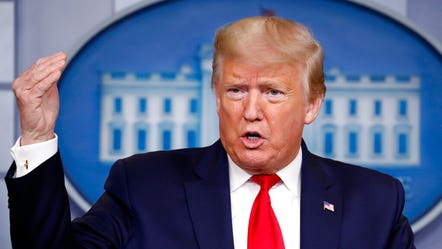By Megan Henney FOXBusiness
President Trump declared on Monday that he has the power to “open up” states following strict stay-at-home measures adopted to curb the spread of the novel coronavirus — not governors.
“It is the decision of the President, and for many good reasons,” Trump wrote in a tweet. “With that being said, the Administration and I are working closely with the Governors, and this will continue. A decision by me, in conjunction with the Governors and input from others, will be made shortly!”
The tweet sets up a potential showdown between Trump and state governors as some White House officials eye May 1 as a possible date to begin easing social distancing guidelines and restart parts of the country to blunt the economic damage from the pandemic.
With the economy all but paralyzed, unemployment has surged to more than 16 million in the past three weeks alone, a stunning sign of the depth of the pain inflicted by the shutdown, and economists are increasingly warning of a severe contraction in the second quarter, with some estimates ranging as high as 38 percent.
With some signs the virus has started to plateau in New York, the American epicenter, and a lower-than-projected death toll, Trump has indicated a desire to roll back some of the mitigation measures.
"I'm going to have to make a decision, and I only hope to God that it's the right decision," Trump said Friday at the White House. "It's the biggest decision I've ever had to make."
The federal social distancing guidelines unveiled by the Trump administration in mid-March are not mandatory, although states are encouraged to adhere to the recommendations.
More than 40 states have issued stay-at-home orders, according to the National Governors Association, meaning the decision of whether to lift those mandates or not would belong to those governors — not the White House.
Although Trump could likely use the vast power of his bully pulpit to influence states, particularly those with Republican governors, to adhere to federal measures, “the president cannot simply order state and local officials to change their policies,” Bobby Chesney, a University of Texas School of Law professor, wrote in a recent analysis.
Under the 10th Amendment, “the powers not delegated to the United States by the Constitution, nor prohibited by it to the States, are reserved to the States respectively, or to the people.”
Although federal law is supreme over state law in the country, Chesney noted there’s no existing federal statute that runs contrary to the stay-at-home edicts and said there’s little chance that Congress passes a law that even appears to grant Trump authority to override state and local laws.
"No federal statute gives the president the authority to override state decisions. Nor does he possess this inherent authority under Article II of the Constitution. Nor do any other provisions of the Constitution (such as the interstate commerce clause) confer this power on him,” William Galston, a senior fellow at the Brookings Institute wrote in a recent blog. “IIf governors choose to disregard his call to reopen their states, their decisions will be final, and the president will have to live with them.”
Source: FoxBusiness

No comments:
Post a Comment